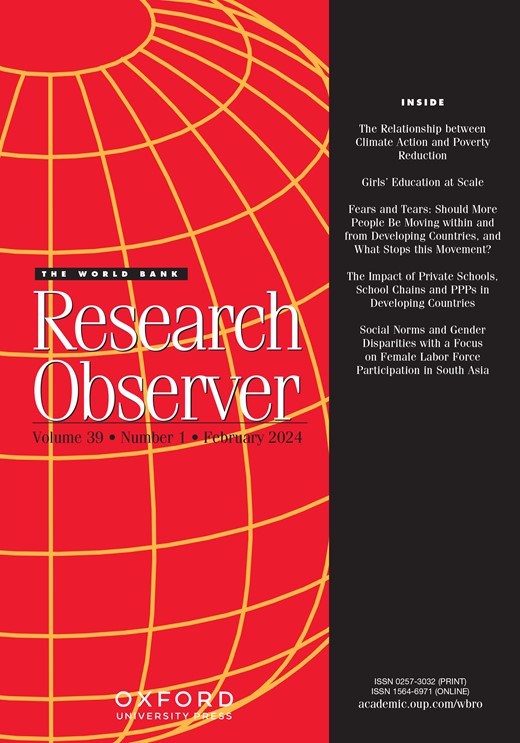What Does Climate Change Mean for Agriculture in Developing Countries
IF 3.3
1区 经济学
Q1 DEVELOPMENT STUDIES
引用次数: 43
Abstract
Mendelsohn and Dinar review much of the important work on the implications of climate change for agriculture, focusing particularly on developing countries. Their message is that efficient economic adaptation significantly reduces the estimated effects of climate change. Few dispute that some amount of adaptation is likely and that its potential contribution to reducing the negative impacts of global warming is large. One such study (Darwin and others 1995), which analyzed the global impacts using an ecozone (land class) methodology, found that without adaptation, average cereal production yields fell roughly 20 to 30 percent in four different climate scenarios. Through various channels of adaptation (modifying crops and techniques on existing farmland, shifting crops to new land, and responding to changing market prices), these losses were reversed, resulting in small increases in production worldwide (0 to 1 percent) even before considering the positive effects of carbon dioxide (CO2) fertilization (tab...气候变化对发展中国家的农业意味着什么
Mendelsohn和Dinar回顾了许多关于气候变化对农业影响的重要工作,特别关注发展中国家。他们的信息是,有效的经济适应可以显著降低气候变化的估计影响。很少有人质疑,一定程度的适应是可能的,而且它对减少全球变暖的负面影响的潜在贡献是巨大的。其中一项研究(达尔文等人1995年)使用生态区(陆地类)方法分析了全球影响,发现如果不适应,在四种不同的气候情景下,平均谷物产量下降了大约20%至30%。通过各种适应渠道(改造现有农田的作物和技术,将作物转移到新的土地上,以及响应不断变化的市场价格),这些损失得到了扭转,甚至在考虑二氧化碳(CO2)施肥的积极影响之前,导致全球产量小幅增加(0 - 1%)。
本文章由计算机程序翻译,如有差异,请以英文原文为准。
求助全文
约1分钟内获得全文
求助全文
来源期刊

World Bank Research Observer
Multiple-
CiteScore
12.60
自引率
1.20%
发文量
8
期刊介绍:
The World Bank Journals, including the Research Observer, boast the largest circulation among economics titles. The Research Observer is distributed freely to over 9,100 subscribers in non-OECD countries. Geared towards informing nonspecialist readers about research within and outside the Bank, it covers areas of economics relevant for development policy. Intended for policymakers, project officers, journalists, and educators, its surveys and overviews require only minimal background in economic analysis. Articles are not sent to referees but are assessed and approved by the Editorial Board, including distinguished economists from outside the Bank. The Observer has around 1,500 subscribers in OECD countries and nearly 10,000 subscribers in developing countries.
 求助内容:
求助内容: 应助结果提醒方式:
应助结果提醒方式:


